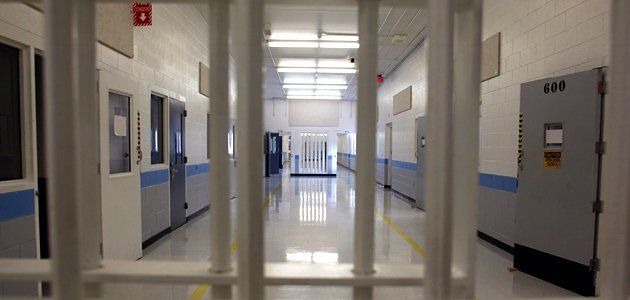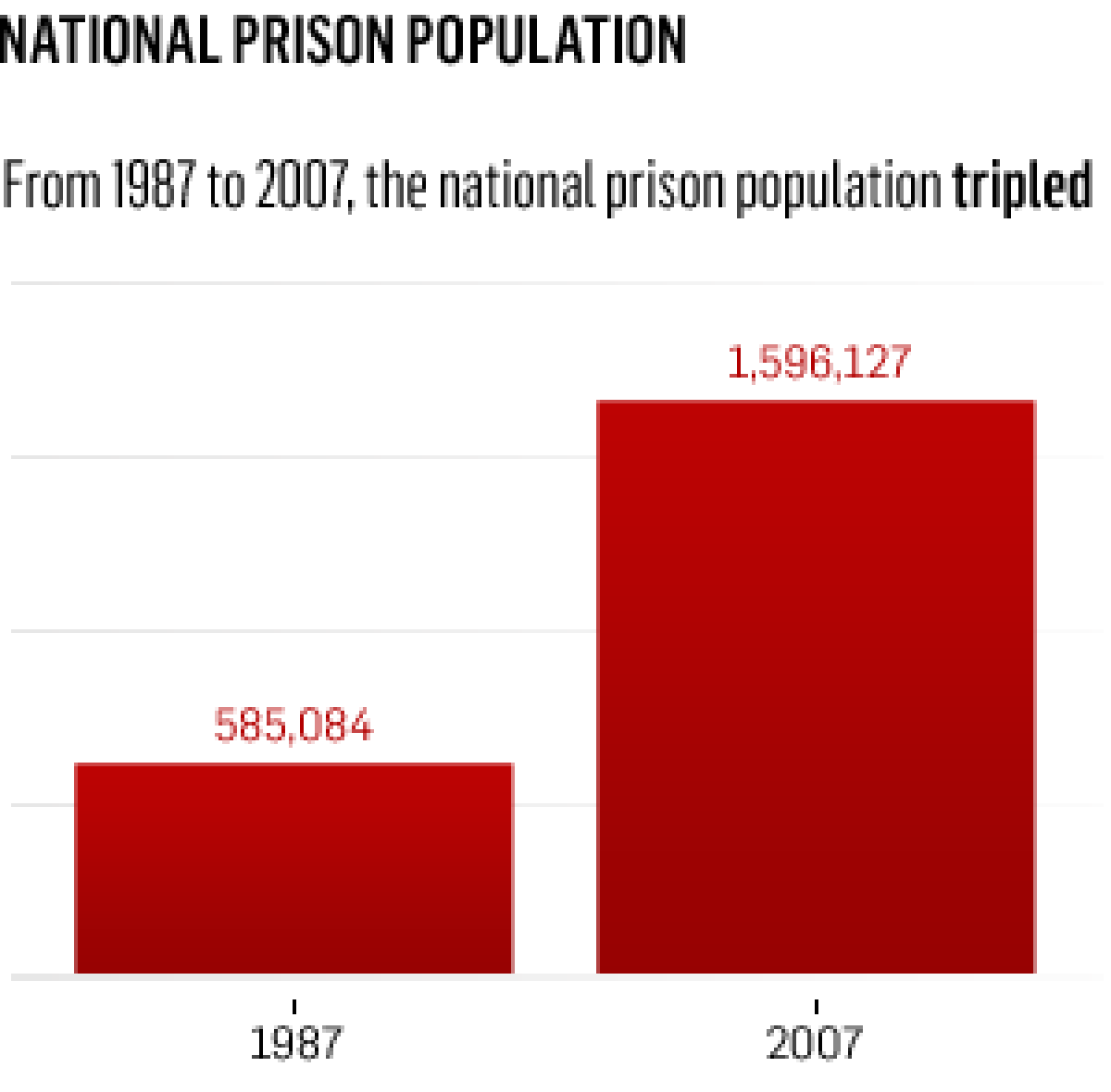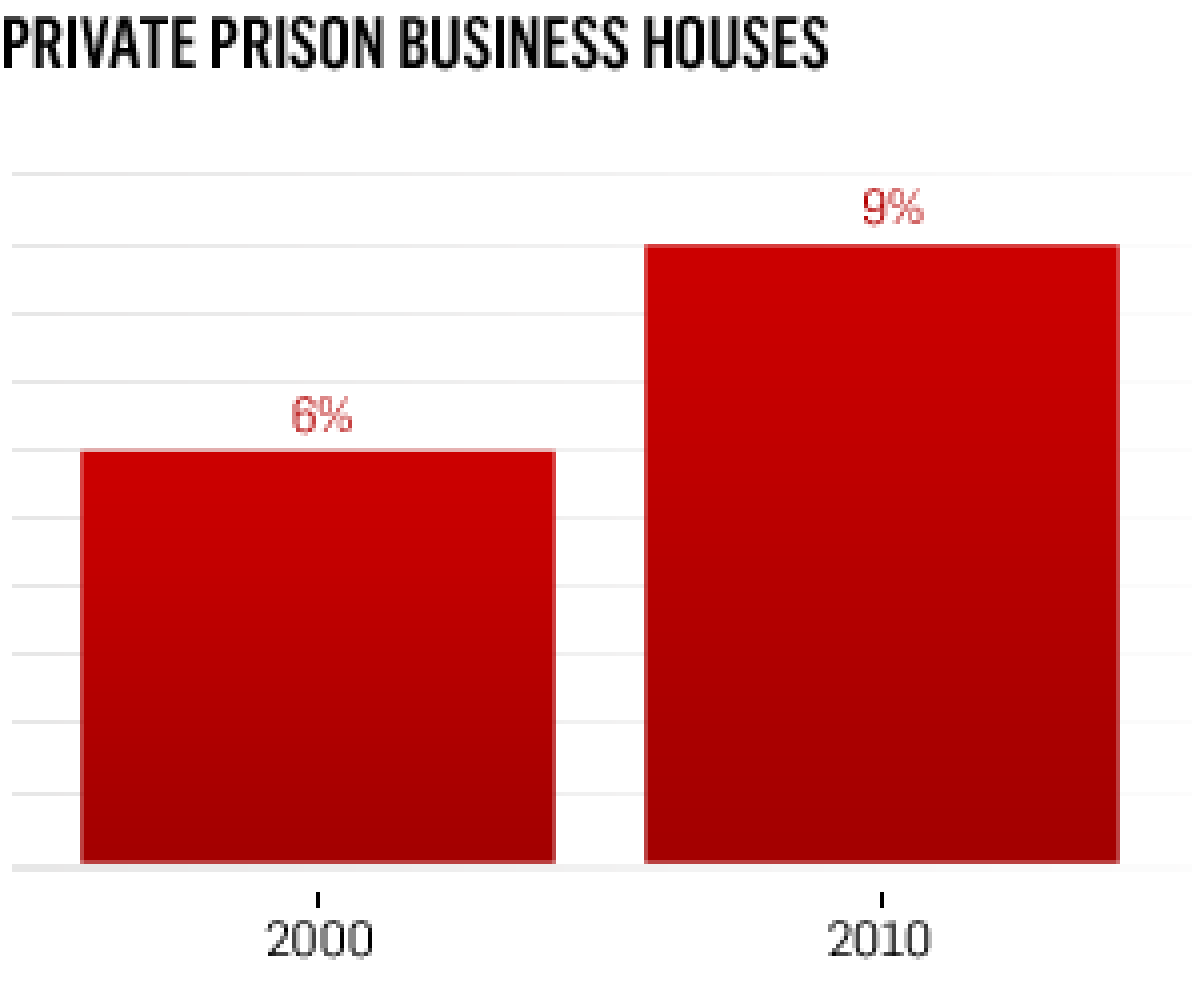
Baldwin, Mich., (population 1,107), will soon have more prison beds than full-time residents. On the outskirts of town, one of the country's largest private prison companies recently spent $60 million to expand a former juvenile prison into a 1,755-bed facility meant to house illegal immigrants before deportation. This is the same town where every summer locals gather for a carnival nicknamed Troutarama at which teenage girls vie for the crown of Ms. Lake County. Thirty-two percent of Baldwin's families live below the poverty line, in a state with a 13.6 percent unemployment rate, compared to the national unemployment rate of 9.7 percent. Baldwin residents were counting on the private prison to create jobs, but this past March, the federal government pulled back its funding on the bid. This left the Geo Group, Inc., with an empty fortress in the middle of rural Michigan, 85 miles north of Grand Rapids.

A similar scenario is playing out across the country, in states such as California, Oklahoma, and Colorado, where entire private prisons now sit vacant. The Huerfano County Correctional Facility in Colorado and the Diamondback Correctional Facility in Oklahoma temporarily shut their doors this spring after the state of Arizona stopped sending prisoners out of state in an effort to save money. Cornell Companies, one of the three largest private prison operators in the U.S., expects two of its California prisons to remain empty through 2010, while 11,600 of Correction Corporation of America's beds were unoccupied as of early May. The empty prisons are not a result of the number of inmates dropping. In fact, according to the Pew Public Safety Performance Project, the number of inmates rose in 2007 in Arizona, Ohio, Kentucky, Mississippi, and Florida. Instead, the empty beds are because state corrections agencies are crowding prisoners into more facilities as they do in California, or trying to change legislation to make sentencing less harsh for nonviolent criminals. The private prison industry's reliable mix of housing state and federal inmates and illegal immigrants—a model that helped to fuel two decades of growth—is no longer a surefire way to get rich. "There are only so many places you can find people," says Martin F. Horn, a former commissioner with the New York City Department of Correction and a lecturer at the John Jay College of Criminal Justice.
Though it's certainly not disappearing and there are signs of a potential recovery for the sector, the private corrections business is under financial pressure to change its business plan, and as that happens, prison advocates worry that the industry and it's bottom-line approach will come to dominate other areas of the justice system. Rather than worrying about upping the number of inmates, private prison companies are tapping into overseas markets and offering a wider range of services. GEO increased its revenue by $20.2 million in the last year by opening up prisons in Australia and the United Kingdom, while also eyeing contracts in South Africa and New Zealand. Cornell runs halfway houses and youth prisons and has noticed an uptick in the demand for drug treatment, housing, or job placement programs that help prisoners reenter society. "The challenge for reentry is funding," says James Hyman, CEO and president of Cornell Companies. "If states can't fund programs for their star college graduates, how do they fund programs for the prisoners?"

The private prison business experienced a similar watershed moment starting in the late 1990s and into early 2000. Shares of private prison companies then traded at roughly $2.50 (today, a share of GEO or CCA can easily sell for anywhere between $21 and $29), CCA also had thousands of empty beds, and the industry as a whole faced scandals over its treatment of prisoners. Twelve former prison guards in Texas had been indicted for sleeping with female prisoners, while a juvenile prison in Louisiana lost its contract after the U.S. Justice Department charged its guards with beating and throwing tear gas at the boys housed there. But two major events saved the industry. The Federal Bureau of Prisons saw an uptick in its number of prisoners (from 1987 to 2007, the national prison population tripled, from 585,084 to 1,596,127, according to a report by the Pew Center on the States), and then post-9/11, the Bush administration began to detain more immigrants and house them at a patchwork of private facilities across the United States.
The industry's political connections have also likely helped ensure its longevity. The boards of directors for GEO and CCA read like a who's who from past administrations and include both Republicans and Democrats. GEO board member Norman Carlson served as the director of the Federal Bureau of Prisons for 17 years. CCA's board boasts Thurgood Marshall Jr., former cabinet secretary to President Bill Clinton and son of the late Supreme Court justice, as well as former U.S. senator Dennis DeConcini, Democrat of Arizona, who, during his 18-year tenure in Congress, served on the judiciary and appropriations committees. DeConcini says he has never lobbied on behalf of CCA, though he did, as a board member, attend a meeting with the director of the Arizona Department of Corrections and has publicly spoken in favor of the private prison business. During the 2008 election cycle, the political action committees of GEO, Cornell, and CCA, the three largest companies, were also generous, donating a total of roughly $679,000 to political groups and politicians from key states where they are courting new business, including Arizona, California, Louisiana, and Florida. "The private prisons companies know how to play the legislative game," says Michael Jacobson, director of the Vera Institute of Justice.
As the economy recovers, both industry stock analysts and executives from Cornell and CCA say business is cylical and will rebound (GEO did not want to comment on the record). The private prison business now houses just under 9 percent of U.S. prisoners, compared to 6 percent in 2000, says Damon Hininger, president and CEO of CCA. Though it's unclear where the new business will come from, Hininger points to several options. California's budget crisis could actually prove to be a boon to business, since its prisons already are so overcrowded. The Federal Bureau of Prisons recently announced that it's looking for a few thousand additional beds, and private prison executives argue that they operate 10 to 20 percent cheaper than state-run facilities, in part because they do not have to contend with the salaries and benefits of state correctional officers' unions. (Corrections unions, for their part, say that makes the private prison guards less qualified and trained to deal with criminals and less prone to oversight.) "When I think about the future constraints on state governments, the fact that we can build quickly and cheaply only increases our value," says Hyman of Cornell Companies.
The only part of the story left is the prisoners themselves. As David Fathi of the ACLU National Prison Project points out, "Prisoners cannot decide they don't like where they live." Because the private prison business does not follow the same rules as the rest of the market, in which consumers voice their preferences through what they buy, the question of how and where we house prisoners becomes merely an issue of economics. And for the private prison companies, the answer so far has been lucrative—as private prison executives are confident it will continue to be.
Find out more about the social and economic impact of America's prisons in our series. Read about the debate over whether cash-strapped states should cut classrooms or prison cells, and find out why we should treat drug addicts in prison.
Uncommon Knowledge
Newsweek is committed to challenging conventional wisdom and finding connections in the search for common ground.
Newsweek is committed to challenging conventional wisdom and finding connections in the search for common ground.
About the writer
To read how Newsweek uses AI as a newsroom tool, Click here.








